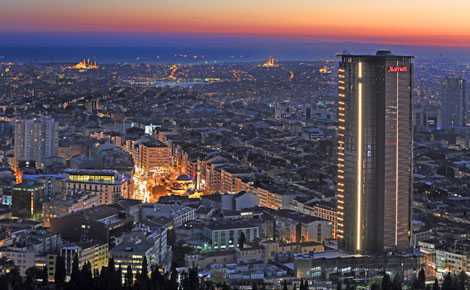By BURAK EGE BEKDIL

Rotor Goals: Turkey will co-produce the T-70 helicopter, the Turkish version of Sikorsky’s S-70i Black Hawk. (Sikorsky Aircraft)
ANKARA — Turkey’s procurement authorities are hoping that a recently signed US $3.5 billion contract with US helicopter maker Sikorsky will not only earn the local industry critical capabilities and support the country’s indigenous helicopter program, but also bring in more than $1 billion in revenue through exports.
“This is a win-win deal. The contractors’ gains may be financial or corporate, but we hope ours will be financial and strategic,” said one senior procurement official familiar with the program.
The contract, signed Feb. 21, involves the co-production in Turkey of an initial batch of 109 T-70 Black Hawk utility helicopters, the Turkish version of Sikorsky Aircraft’s S-70 Black Hawk International. Turkey’s procurement agency, the Undersecretariat for Defense Industries (SSM), said the total production figure will eventually reach 300.
“For every helicopter to be produced in Turkey, another will be exported,” SSM said in a statement. That makes 300 helicopters for Turkey and 300 for other countries.
“I doubt if there will be such a large international demand for the Turkish-made Black Hawks,” one London-based Turkey specialist said. “But I am sure the Turks are right about the capabilities they are hoping to earn.”
Under the program, Tusas Turkish Aerospace Industries (TAI) will be the prime contractor, and Sikorsky and Turkish companies Aselsan, Tusas Turkish Engine Industries (TEI) and Alp Havacilik will be subcontractors.
Military electronics specialist Aselsan is Turkey’s largest defense company, and Alp Havacilik is an aviation concern owned 50 percent by Sikorsky. Alp will produce the landing gear.
TEI will produce in Turkey the T-700 engine for the Black Hawk, under license from General Electric.
Aselsan will design, develop and produce glass cockpit avionics for the Turkish utility helicopter. That cockpit will be used in all Black Hawks to be sold to foreign markets, except for the US Army.
SSM officials said Turkish industry will get 67 percent work share, and earn $1.4 billion over 30 years.
Turkey in 2011 selected Sikorsky as its partner company to lead production of the country’s next-generation utility helicopter. Sikorsky defeated Italian-British Westland.
The S-70 Black Hawk International is used by dozens of militaries, including Turkey. AgustaWestland was competing with its TUHP 149, the Turkish version of its newly developed A-149.
In May, Turkey’s procurement office said Turkey “had come very close to signing a $3.5 billion contract with Sikorsky Aircraft for the co-production of scores of utility helicopters.” But penning the deal had since been delayed as top Turkish procurement managers accused “US corporate and other bureaucracy” for factors that caused delays.
Most helicopters in the first batch will go to the military, with the Gendarmerie receiving the largest portion, and the Army, Navy, Air Force and the special forces command each getting their share. The remaining machines will go to the Security Directorate, meaning the police forces, and to the government’s Firefighting Department.
According to the production timetable, the first helicopter will be delivered to the Firefighting Department 55 months after the program takes effect. Two months later, in the 57th month, the Turkish Land Forces will get its first T-70.
“This program is unprecedented in Sikorsky’s 90-year history,” Sikorsky President Mick Maurer said in a news release March 4. “We have signed contracts that collectively will raise our already strong supplier and customer relationships in Turkey to levels that we expect will endure for decades.
“We are very pleased that these agreements also will potentially open additional markets for the world’s leading utility military helicopter while strengthening Turkish industry’s position as a world-class aerospace provider,” Maurer said. ■
via Turkey Hopes Sikorsky Deal Boosts Local Industry, Exports | Defense News | defensenews.com.






